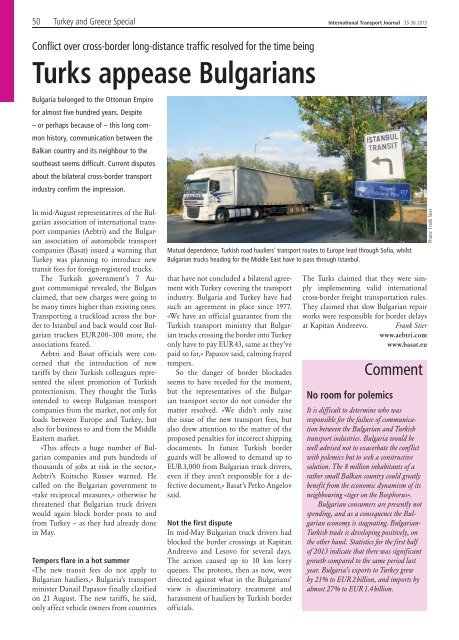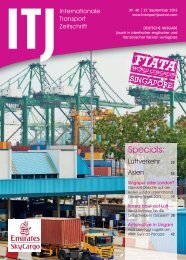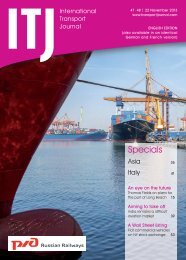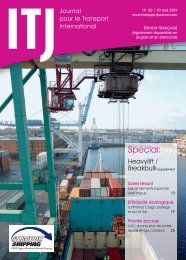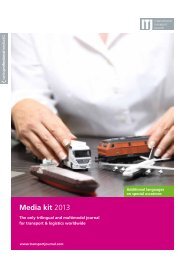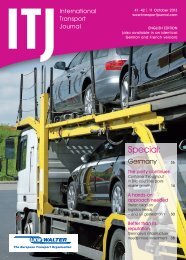Specials - ITJ | Transport Journal
Specials - ITJ | Transport Journal
Specials - ITJ | Transport Journal
- No tags were found...
Create successful ePaper yourself
Turn your PDF publications into a flip-book with our unique Google optimized e-Paper software.
50 Turkey and Greece Special International <strong>Transport</strong> <strong>Journal</strong> 35-36 2013Conflict over cross-border long-distance traffic resolved for the time beingTurks appease BulgariansBulgaria belonged to the Ottoman Empirefor almost five hundred years. Despite– or perhaps because of – this long commonhistory, communication between theBalkan country and its neighbour to thesoutheast seems difficult. Current disputesabout the bilateral cross-border transportindustry confirm the impression.In mid-August representatives of the Bulgarianassociation of international transportcompanies (Aebtri) and the Bulgarianassociation of automobile transportcompanies (Basat) issued a warning thatTurkey was planning to introduce newtransit fees for foreign-registered trucks.The Turkish government’s 7 Augustcommuniqué revealed, the Bulgarsclaimed, that new charges were going tobe many times higher than existing ones.<strong>Transport</strong>ing a truckload across the borderto Istanbul and back would cost Bulgariantruckers EUR 200–300 more, theassociations feared.Aebtri and Basat officials were concernedthat the introduction of newtariffs by their Turkish colleagues representedthe silent promotion of Turkishprotectionism. They thought the Turksintended to sweep Bulgarian transportcompanies from the market, not only forloads between Europe and Turkey, butalso for business to and from the MiddleEastern market.«This affects a huge number of Bulgariancompanies and puts hundreds ofthousands of jobs at risk in the sector,»Aebtri’s Koitscho Russev warned. Hecalled on the Bulgarian government to«take reciprocal measures,» otherwise hethreatened that Bulgarian truck driverswould again block border posts to andfrom Turkey – as they had already donein May.Tempers flare in a hot summer«The new transit fees do not apply toBulgarian hauliers,» Bulgaria’s transportminister Danail Papasov finally clarifiedon 21 August. The new tariffs, he said,only affect vehicle owners from countriesMutual dependence. Turkish road hauliers’ transport routes to Europe lead through Sofia, whilstBulgarian trucks heading for the Middle East have to pass through Istanbul.that have not concluded a bilateral agreementwith Turkey covering the transportindustry. Bulgaria and Turkey have hadsuch an agreement in place since 1977.«We have an official guarantee from theTurkish transport ministry that Bulgariantrucks crossing the border into Turkeyonly have to pay EUR43, same as they’vepaid so far,» Papasov said, calming frayedtempers.So the danger of border blockadesseems to have receded for the moment,but the representatives of the Bulgariantransport sector do not consider thematter resolved. «We didn’t only raisethe issue of the new transport fees, butalso drew attention to the matter of theproposed penalties for incorrect shippingdocuments. In future Turkish borderguards will be allowed to demand up toEUR 3,000 from Bulgarian truck drivers,even if they aren’t responsible for a defectivedocument,» Basat’s Petko Angelovsaid.Not the first disputeIn mid-May Bulgarian truck drivers hadblocked the border crossings at KapitanAndreevo and Lesovo for several days.The action caused up to 10 km lorryqueues. The protests, then as now, weredirected against what in the Bulgarians’view is discriminatory treatment andharassment of hauliers by Turkish borderofficials.The Turks claimed that they were simplyimplementing valid internationalcross-border freight transportation rules.They claimed that slow Bulgarian repairworks were responsible for border delaysat Kapitan Andreevo. Frank Stierwww.aebtri.comwww.basat.euNo room for polemicsCommentIt is difficult to determine who wasresponsible for the failure of communicationbetween the Bulgarian and Turkishtransport industries. Bulgaria would bewell advised not to exacerbate the conflictwith polemics but to seek a constructivesolution. The 8 million inhabitants of arather small Balkan country could greatlybenefit from the economic dynamism of itsneighbouring «tiger on the Bosphorus».Bulgarian consumers are presently notspending, and as a consequence the Bulgarianeconomy is stagnating. Bulgarian-Turkish trade is developing positively, onthe other hand. Statistics for the first halfof 2013 indicate that there was significantgrowth compared to the same period lastyear. Bulgaria’s exports to Turkey grewby 21% to EUR2billion, and imports byalmost 27% to EUR1.4billion.Photo: Frank Stier


